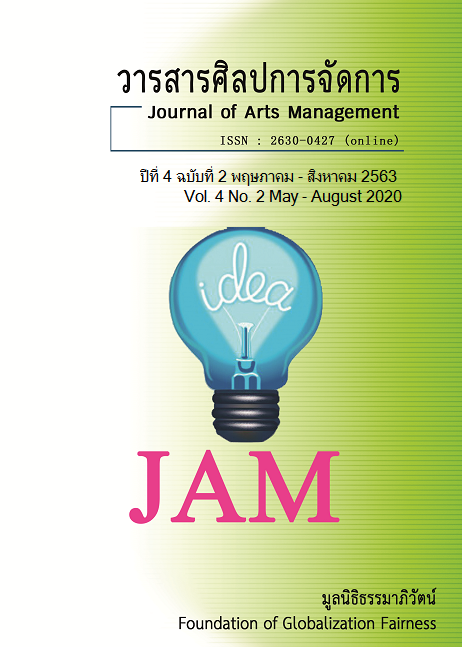Knowledge Management About Investigative Work That is The Best Practice of The Detective 4.0 Era
Main Article Content
Abstract
The purposes of this research were to 1) study the state, problems and solutions for investigation in Thailand 2) manage knowledge of investigation in Thailand. Population used in the research were police officers at operational level, investigative work in police stations under the Metropolitan Police Bureau, Provincial Police Region 1 to 9, Immigration Office, Central Police Headquarters and the Narcotics Suppression Bureau. Former experienced detectives and 1,511 FBI officers and Thai police officers who have completed the FBI training program, using mixed methods, quantitative and qualitative methods.
1.The research found that the problem of investigation work in Thailand is at the average level of average ( = 2.80). When considering each aspect, it is found that the aspect that had the most problems at a medium level was the problems of pre-incident investigation. When considering each item found that the problems that are most ranked in 3 levels are at the moderate level, namely 1) studying behavior of criminals during interrogation 2) training exercise, preparation for strength to work in all situations 3) Investigate local information. Sources of potential crime respectively.
2.Knowledge management, investigation are divided into 1) investigation before the accident that investigators must have an ideology, perseverance and adhere to the work principles. They also have to both be physically and mentally stable. 2) Investigation after the incident that give priority to the treatment of crime scenes, proof of work collection of forensic evidence and question systematically according to psychological processes, investigative techniques and the legal system that facilitate police operations. 3) Investigations in the 4.0 era must be also both physically and mentally ready. The evidence is clear, legally that technology could help with the investigation and investigators have to learn and continuously develop all personnel in the department. There is a central agency to support the validation of personal information legally which should integrate collaboration into a network.
Article Details
Views and opinions appearing in articles in the Journal of Arts of Management It is the responsibility of the author of the article. and does not constitute the view and responsibility of the editorial team I agree that the article is copyright of the Arts and Management Journal.
References
คณะกรรมการพัฒนาระบบราชการ. (2546). แผนยุทธศาสตร์การพัฒนาระบบราชการไทย (พ.ศ. 2546 - พ.ศ. 2550). กรุงเทพฯ: ภารกิจการเผยแพร่และสนับสนุนการมีส่วนร่วมในการพัฒนาระบบราชการ สำนักงานคณะกรรมการพัฒนาระบบราชการ.
ทิพวรรณ หล่อสุวรรณรัตน์. (2548). ทฤษฎีองค์การสมัยใหม่.(พิมพ์ครั้งที่ 6). กรุงเทพฯ: รัตนไตร.
บูรชัย ศิริมหาสาคร. (2550). จัดการความรู สูความเปนเลิศ. กรุงเทพฯ:แสงดาว.
พรธิดา วิเชียรปัญญา. (2547). การจัดการความรู้ : พื้นฐานและการประยุกต์ใช้ (Knowledge Management). กรุงเทพฯ: ธรรกมลการพิมพ์.
ปริญญา รัชอินทร์. (2552). ปัญหาและอุปสรรคในการปฏิบัติงานสืบสวนของเจ้าหน้าที่ตำรวจกองบังคับการตำรวจนครบาล 7. การค้นคว้าอิสระ. รปม. (อาชญาวิทยาและการบริหารงานยุติธรรม). มหาวิทยาลัยรังสิต.
ปราโมทย์ จันทร. (2558). แนวทางในการป้องกันและแก้ไขปัญหาอาชญากรรมในเขตพื้นที่สถานีตำรวจนครบาลบางโพงพาง. การค้นคว้าอิสระ. รปม. (อาชญาวิทยาและการบริหารงานยุติธรรม). มหาวิทยาลัยรังสิต.
วิจารณ์ พานิช. (2547). ความรู้ยุคใหม่อยู่ใน “คน” มากกว่า “ตำรา”. วารสารปฏิรูป, 7(80) : 62 – 68.
วิทยา ราชแก้ว. (2558). แนวทางการพัฒนาประสิทธิภาพในการปฏิบัติงานของตำรวจฝ่ายสืบสวน กองกำกับการสืบสวนตำรวจภูธรจังหวัดร้อยเอ็ด(วิทยานิพนธ์. รป.ม. สาขาวิชาอาชญาวิทยาและการบริหารงานยุติธรรม). กรุงเทพฯ: บัณฑิตวิทยาลัยมหาวิทยาลัยรังสิต.
เศรษฐพงค์ มะลิสุวรรณ. (2561). Thailand 4.0 กับภัยคุกคามด้านอาชญากรรมไซเบอร์. สืบค้นเมื่อ 16 มกราคม 2562. จาก https://www.it24hrs.com/2016/thailand-4-0-cybersecurity/
สหบาท. (2561). สืบสวนสมัยใหม่. สืบค้นเมื่อ 13 มกราคม 2562. จากhttps://www.thairath.co.th /content/391179
สุภัทท์ บุญญานนท์. (2546). รูไวไมเสียที: การบริหารความรู (Knowledge Management) ตอนที่ 1. วารสารสรรพากรสาสน, 50(9), 79-93.
Chen and Burstein. (2006). A dynamic model of knowledge management for higher education development. May 20, 2013, Retrieved From https://ieeexplore.ieee.org/abstract/ document/4141625.
Makasiranon, k. (2003). Bringing knowledge management for private sector organizations. Bangkok: Chulalongkorn University.
Nanaka. I. (1994). A Dynamic Theory of Organization Knowledge Creation. Organization Science, 5(1), 14-15.
Snowden. D. (2003). การจัดการความรู้: วงจรคุณภาพที่เพิ่มพูน. เอกสารประกอบการสัมมนา. กรุงเทพฯ: เพียร์สัน เอ็ดดูเคชั่น อินโดไชน่า.


